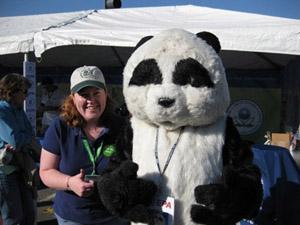Meet EPA Scientist Maureen R. Gwinn, M.S. Ph.D. DABT

Making a Difference in Public Health
EPA biologist Dr. Maureen Gwinn works on human health hazard assessments for the Agency's Integrated Risk Information System (IRIS) program. Dr. Gwinn currently serves as the Associate Program Director for Community Health in EPA's Sustainable and Healthy Communities national research program. In that role, she manages the community public health, children's health and environmental justice research components.
Dr. Gwinn earned her BS degree in Biology at Bates College in Lewiston, Maine and her MS and PhD in Oral Biology at the State University of New York, Buffalo. She is a Diplomat of the American Board of Toxicology.
Along with a passion for science outreach, Maureen also makes jewelry in her spare time and travels home to Maine as often as possible.
How does your science matter?
My science matters because in our Sustainability and Healthy Communities research, we are working to answer important questions about environmental exposures that may relate to increased adverse health effects in communities.
We research various chemical and non-chemical stressors to inform communities’ questions about risks from exposures in their community.
I also support EPA’s Integrated Risk Information System, or IRIS—a human health assessment program that evaluates information on effects that may result from exposures to environmental contaminants. We review the body of research on a specific chemical and create a synthesis of the available published information on that chemical relative to a human health hazard. Our assessments support regulations and decisions that help make communities safer.
If you could have dinner with any female scientist, past or present, who would it be and what would you want to ask them?
I would never have thought of that question! But I have to say Marie Curie, who won the Nobel Prize for physics in 1903. I remember I did a book report on her in the 6th grade. It was fascinating! She went through so much to do her job and to do a job that women did not usually do back then.
The safety measures we take now are so different from what they took in her time. They did not know then that it would be so dangerous to work with radioactive materials, but she thought it might be and she did it anyway. I would like to ask her if she had thought about the health risks of her work. If she had known of how dangerous the work would be, would she have still done it? I would like to think that she would.
When did you first know you wanted to pursue science?
When I was in 6th grade, I was already intrigued by science, and soon I realized that in science you could make a difference. There are other things you can do with my degree, but I like making a difference in public health. One thing I like most about my work at EPA is that I feel like my contribution to protecting public health is more direct.
If you were not a scientist, what would you be doing?
Probably something in event planning. I used to do a lot of fundraising work in West Virginia to raise money to start a no-kill animal shelter. I love animals, and have worked with them in the past (I was a professional dog-walker in graduate school). Again, I wanted to make a difference in an issue I cared about, and used my organizational skills (and my bossy attitude) to help.
Any advice for students considering a career in science?
Make sure you absolutely love whatever area you are going into. Spending time getting your doctoral degree in a field that you do not love will be miserable. And of course, always keep an open mind! I started out in dental research and here I am working in risk assessment. It is okay to move around and try new things, even if you have to go back a few steps. If you love it, it is worth it.
